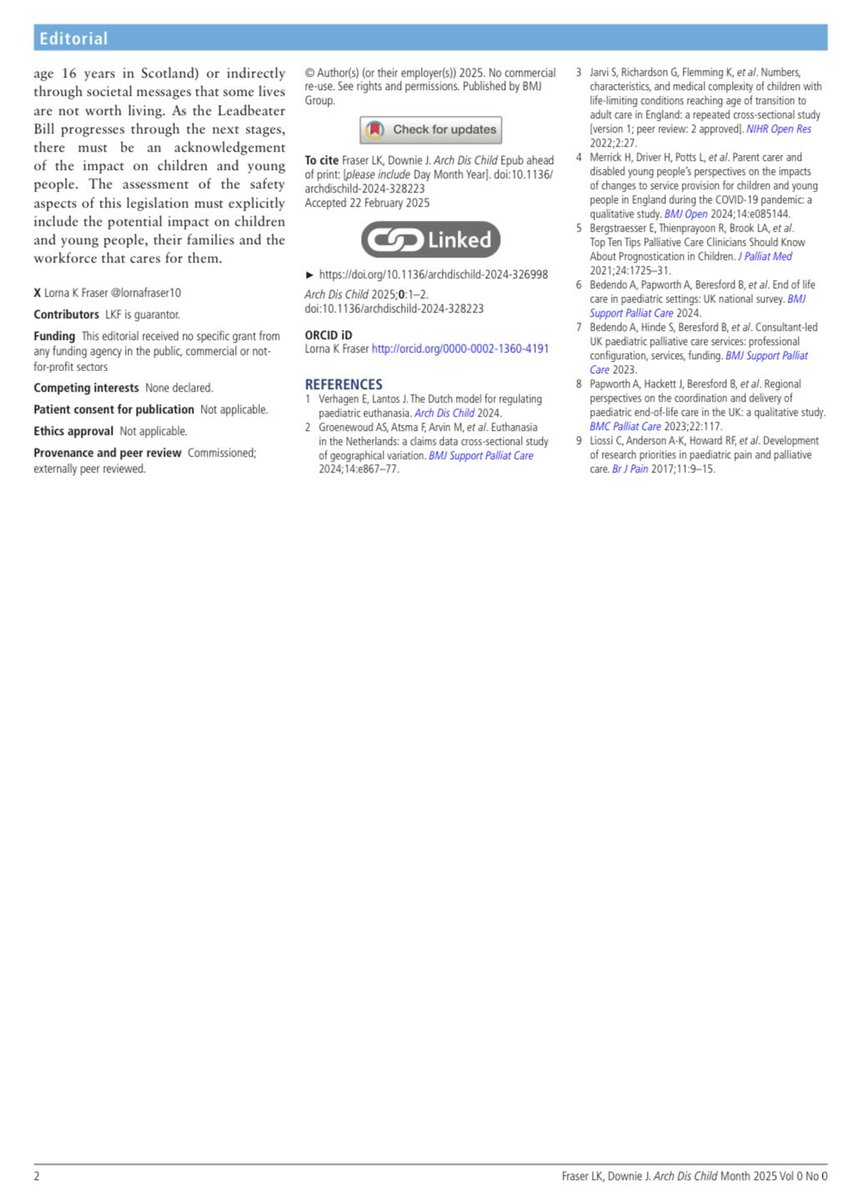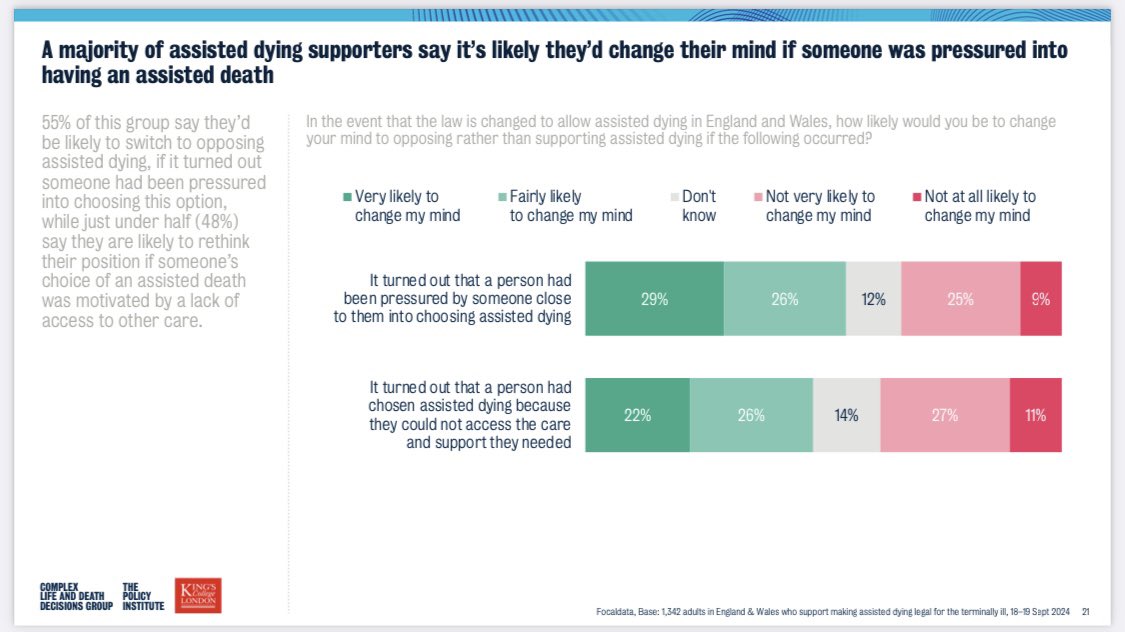Ahead of today’s assisted dying Bill debate, I thought I’d do a thread of FALSE FACTS. You know… campaigning soundbites, PR spin. That come up again and again. And are persuasive… but wrong.
FALSE FACT: 20 people per day would die with unrelieved pain even if they received high quality palliative care
TRUTH: This a back-of-envelope calculation based on a terminally flawed assumption. Details: blogs.bmj.com/spcare/2025/03…
TRUTH: This a back-of-envelope calculation based on a terminally flawed assumption. Details: blogs.bmj.com/spcare/2025/03…
FALSE FACT: Vomiting faeces is something that commonly happens when people are dying
TRUTH: No, this is incredibly rare. Not something I’ve ever seen. Explainer by @Existential_Doc - blogs.bmj.com/spcare/2025/04…
TRUTH: No, this is incredibly rare. Not something I’ve ever seen. Explainer by @Existential_Doc - blogs.bmj.com/spcare/2025/04…
@Existential_Doc FALSE FACT: Suicide is twice as common in people with severe physical illness
TRUTH: Actually this is true. But suicide risk is related to *diagnosis*, and falls dramatically within 3-6 months.
Published in The Lancet thelancet.com/journals/lanep…
TRUTH: Actually this is true. But suicide risk is related to *diagnosis*, and falls dramatically within 3-6 months.
Published in The Lancet thelancet.com/journals/lanep…
FALSE FACT: Many people approach the end of life starve themselves to death
TRUTH: Eating and drinking less is a natural part of dying. The body just doesn’t need as much nutrition when someone is dying as it did. Voluntarily stopping eating and drinking is very unusual.
TRUTH: Eating and drinking less is a natural part of dying. The body just doesn’t need as much nutrition when someone is dying as it did. Voluntarily stopping eating and drinking is very unusual.
FALSE FACT: Doctors can reliably identify those who have only 6 months to live
TRUTH: Nope, research across thousands of prognosis assessments show doctors get it right <50% time
politicshome.com/opinion/articl…
TRUTH: Nope, research across thousands of prognosis assessments show doctors get it right <50% time
politicshome.com/opinion/articl…
FALSE LOGIC: We do not check for coercion now when people go to Dignitas. This Bill just puts a legislative framework around this decision.
ACTUAL LOGIC: This Bill won’t stop people being coerced into going to Dignitas. How could it?
ACTUAL LOGIC: This Bill won’t stop people being coerced into going to Dignitas. How could it?
FALSE FACT: Palliative care professionals are generally against assisted dying because they are very religious.
RESPONSE: Give me strength.
RESPONSE: Give me strength.
FALSE FACT: People with morphine allergy cannot receive pain relief.
TRUTH: True morphine allergy is rare. People who *are* allergic to morphine can receive other opioids safely. There are also non-opioids, and non-drug approaches that can be used to manage pain.
TRUTH: True morphine allergy is rare. People who *are* allergic to morphine can receive other opioids safely. There are also non-opioids, and non-drug approaches that can be used to manage pain.
FALSE FACT: People with anorexia would not be eligible for assisted dying under the TIA Bill
TRUTH: Read what the Royal College of Psychiatrists have to say (pg 6)rcpsych.ac.uk/docs/default-s…
TRUTH: Read what the Royal College of Psychiatrists have to say (pg 6)rcpsych.ac.uk/docs/default-s…
FALSE FACT: The Mental Capacity Act is agreed to be the appropriate framework for testing capacity for the decision to have an assisted death.
TRUTH: Leading psychiatrists and @rcpsych disagree.
TRUTH: Leading psychiatrists and @rcpsych disagree.
@rcpsych FALSE FACT: Coercion is more likely to occur ‘the other way’.
RESPONSE: Please clarify if all suicide prevention is coercion, or is it just considered coercion when the person is (roughly estimated to be) in their last 6 months of life?
RESPONSE: Please clarify if all suicide prevention is coercion, or is it just considered coercion when the person is (roughly estimated to be) in their last 6 months of life?
@rcpsych FALSE FACT: Assisted dying doesn’t shorten peoples lives, it shortens their death.
TRUTH: Let’s be serious. Of course if you give someone lethal substances to self-administer it will shorten their life. That’s the point.
TRUTH: Let’s be serious. Of course if you give someone lethal substances to self-administer it will shorten their life. That’s the point.
FALSE FACT: Assisted dying means people won’t die in excruciating pain.
TRUTH: First, AD doesn’t relieve pain. Many different drugs and non-medical approaches (eg nerve blocks) can effectively relieve pain in dying ppl. Pain is low down the list of reasons why people request AD.
TRUTH: First, AD doesn’t relieve pain. Many different drugs and non-medical approaches (eg nerve blocks) can effectively relieve pain in dying ppl. Pain is low down the list of reasons why people request AD.
FALSE FACT: There is an upper limit to the amount of morphine dying patients are ‘allowed’.
TRUTH: There is no upper limit to morphine dose. If people have side effects from one drug, we can switch to another to ensure pain relief.
TRUTH: There is no upper limit to morphine dose. If people have side effects from one drug, we can switch to another to ensure pain relief.
FALSE FACT: Pain is inevitable at the end of life.
TRUTH: No! Many dying people never experience pain.
TRUTH: No! Many dying people never experience pain.
FALSE FACT: The term ‘assisted suicide’ is inaccurate and offensive.
TRUTH: This statement is offensive to people affected by suicide.
If the case is strong, it will withstand strong language.
- @ProfMarkTaubertspectator.co.uk/article/the-im…
TRUTH: This statement is offensive to people affected by suicide.
If the case is strong, it will withstand strong language.
- @ProfMarkTaubertspectator.co.uk/article/the-im…
FALSE FACT: People won’t be able to have an assisted death because they feel they are a burden.
TRUTH: Yes they will. In fact any reason is fine - they don’t even need to be asked. Around half of people in other jurisdictions choose AD because of feeling a burden.
TRUTH: Yes they will. In fact any reason is fine - they don’t even need to be asked. Around half of people in other jurisdictions choose AD because of feeling a burden.
FALSE FACT: Disabled people support assisted dying.
TRUTH: It’s true that in some public opinion polls around 70% people who are disabled support AD. But no disability rights organisation supports assisted dying.
TRUTH: It’s true that in some public opinion polls around 70% people who are disabled support AD. But no disability rights organisation supports assisted dying.
FALSE FACT: Assisted dying need not detract from palliative care.
TRUTH: AD is *already* detracting from palliative care. More than 100,000 people die every year needing palliative care but not receiving it, with inequalities +++. Where’s the commitment to fixing this?
TRUTH: AD is *already* detracting from palliative care. More than 100,000 people die every year needing palliative care but not receiving it, with inequalities +++. Where’s the commitment to fixing this?
FALSE FACT: The TIA Bill incorporates an ‘MDT approach’
TRUTH: A 3 person panel, at the end of the assessment process, does not an MDT make. To be meaningful this needs to happen at the beginning, and each panel member *must* assess the patient in person.
TRUTH: A 3 person panel, at the end of the assessment process, does not an MDT make. To be meaningful this needs to happen at the beginning, and each panel member *must* assess the patient in person.
FALSE FACT: This is the safest, most robust, assisted dying legislation in the world.
TRUTH: It may be. Though we know from all the rejected safeguards that it could be safer. What we know for sure is it won’t be 100% safe. People will slip through the net.
TRUTH: It may be. Though we know from all the rejected safeguards that it could be safer. What we know for sure is it won’t be 100% safe. People will slip through the net.
FALSE FACT: Assisted dying won’t affect children
TRUTH: This law will affect children in many ways. Professionals can bring AD up, and discuss it with children. For children with life-limiting conditions, this law may send societal messages that some lives are not worth living.

TRUTH: This law will affect children in many ways. Professionals can bring AD up, and discuss it with children. For children with life-limiting conditions, this law may send societal messages that some lives are not worth living.


FALSE FACT: The inequality we need to worry about is ensuring access to assisted dying for all groups.
TRUTH: Equality of access is important. But so is ensuring that this law does not deepen mistrust, and worsen health and care, for minoritised people.
TRUTH: Equality of access is important. But so is ensuring that this law does not deepen mistrust, and worsen health and care, for minoritised people.
FALSE FACT: This debate is about people facing terminal illness who want control over their deaths.
TRUTH: Yes, it is about the people who say “I want this”. But it is also about those vulnerable groups who will be harmed (at most grave, have a wrongful death).
TRUTH: Yes, it is about the people who say “I want this”. But it is also about those vulnerable groups who will be harmed (at most grave, have a wrongful death).
FALSE FACT: The public support assisted dying
TRUTH: Yes, opinion polls show general support. But they also show that support is fragile, and half of supporters say they would switch to oppose if people had assisted deaths because they couldn’t access care.
TRUTH: Yes, opinion polls show general support. But they also show that support is fragile, and half of supporters say they would switch to oppose if people had assisted deaths because they couldn’t access care.

• • •
Missing some Tweet in this thread? You can try to
force a refresh




